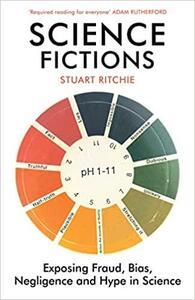Take a photo of a barcode or cover
124 reviews for:
Science Fictions: Exposing Fraud, Bias, Negligence and Hype in Science
Stuart Ritchie
124 reviews for:
Science Fictions: Exposing Fraud, Bias, Negligence and Hype in Science
Stuart Ritchie
informative
inspiring
medium-paced
informative
reflective
sad
slow-paced
challenging
informative
reflective
medium-paced
An incredible book that not only explains many of the problems that plague science in an accessible manner, but furthermore digs into the causes of these problems.
I had previously read [b:Statistics Done Wrong: The Woefully Complete Guide|23241062|Statistics Done Wrong The Woefully Complete Guide|Alex Reinhart|https://i.gr-assets.com/images/S/compressed.photo.goodreads.com/books/1422216326l/23241062._SX50_.jpg|26525687] which mentioned many of the same statistical issues, but focused much more on the 'how' rather than the 'why'.
Both books are excellent and I strongly recommend them both, but Science Fictions really stood out to me for exploring the fundamental causes of the disease and not just the symptoms.
I had previously read [b:Statistics Done Wrong: The Woefully Complete Guide|23241062|Statistics Done Wrong The Woefully Complete Guide|Alex Reinhart|https://i.gr-assets.com/images/S/compressed.photo.goodreads.com/books/1422216326l/23241062._SX50_.jpg|26525687] which mentioned many of the same statistical issues, but focused much more on the 'how' rather than the 'why'.
Both books are excellent and I strongly recommend them both, but Science Fictions really stood out to me for exploring the fundamental causes of the disease and not just the symptoms.
informative
medium-paced
challenging
informative
inspiring
reflective
medium-paced
I'm a medical doctor and a scientist. I think the highest praise I can give to this book is how uncomfortable it made me feel. It was like finally going down to the basement of your house to find out what the weird smell that is coming from there is. You know it won't be pretty, it won't be pleasant, and you know it's unwise to keep postponing it.
Science Fictions cleverly explains the key problems that science faces nowadays (which, as the author points out, are not new but freshly exacerbated). It delineates the causes of such flaws and proposes a few solutions. The writing is accessible to anyone, highly engaging and clear.
Thought-provoking and unsettling. A must read for every university student and faculty member, in my opinion.
Science Fictions cleverly explains the key problems that science faces nowadays (which, as the author points out, are not new but freshly exacerbated). It delineates the causes of such flaws and proposes a few solutions. The writing is accessible to anyone, highly engaging and clear.
Thought-provoking and unsettling. A must read for every university student and faculty member, in my opinion.
Science is a process done by humans for the benefit of humankind. As we all bask in the bright lights that are the many benefits of science, we must constantly be on guard for the ways in which science can go sideways. Many, actually most, of these sideways ways are unintentional and can be done by the best of scientists with the best of intentions. In fact, good intentions themselves can be a source of the bias and hype mentioned in the title of Ritchie’s book. “Science Fictions” is a hard-scrabbled look at the state of modern scientific inquiry which should be read widely by practicing scientists, especially those early in the scientific education or career. Nonscientists interested in getting an insider’s look at how the proverbial sausage is made may struggle with some of the minutia (p-hacking, h-factors, etc.) but should be sustained by the various examples, many of which should ring familiar to attentive readers, Ritchie employs to anchor the narrative. An important piece of popular science writing that deserves a wider audience than it is likely to attract.
medium-paced
informative
medium-paced

